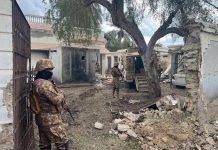Former Pakistani Prime Minister Imran Khan’s arrest has created a tense situation in Pakistan. The central leadership of the Tehreek-e-Insaf Party has also been detained. Protests have been taking place for three days in various cities, including Islamabad, Punjab, and Pakhtunkhwa, resulting in the burning of government properties, such as the house of the Corps Commander of the Pakistan Army in Lahore and the Radio Pakistan building in Peshawar. Internet services have been shut down for three days to suppress the protest movement.
Political analysts in Pakistan see these events as indicative of the Pakistan Army’s policies. They argue that it was the serving generals who brought Imran Khan into power, and now the country is facing a tense situation due to their internal strife. While protesters in Punjab have engaged in attacks on police vehicles, public and private properties, and army cantonments, the Pakistan Army has refrained from using force to quell the demonstrations. The army spokesman has stated that they will handle the situation with patience and avoid using force against the protesters.
Baloch, Pashtun, and Sindhi leaders express concerns about the differential reaction to incidents in Punjab. They assert that if similar incidents had occurred on behalf of the Baloch, Sindhi, or Pashtun nations, the Pakistan Army would have responded with extreme brutality, turning those areas into slaughterhouses. The restrained use of force by the Pakistan Army in Punjab suggests that other nations, including Baloch, Sindhi, and Pashtun, are considered subordinate in Pakistan, and they should refrain from comparing themselves to the Punjabi nation.
While Imran Khan was quickly granted bail by the Supreme Court of Pakistan, Pashtun leader Ali Wazir was unjustly imprisoned for two years on false charges in Karachi Central Jail, with the Pakistani courts remaining silent on the matter. Advocate Iman Mazari points out that out of the list of 69 forcibly missing students submitted by the Baloch Students Commission, 59 are still unaccounted for.
The lenient treatment of Punjab’s leaders by the army and judiciary, coupled with the swift delivery of justice in some cases and frequent injustices and mistreatment of other nations, creates the perception that the country primarily belongs to the people of Punjab. These actions by the Pakistani state widen the gap between other nations and Pakistan, which may pose long-term problems for the state.






























